WMIS DEI Activities
DEI Working Group
The mission of DEI Working Group is to advance equity and diversity – including race, ethnicity, age, gender, religion, sexual orientation, gender identity, disability, economic status, membership status, employment type and other diverse backgrounds – at all levels within WMIS.
Leadership
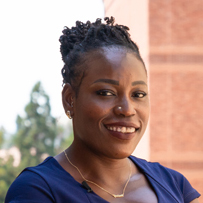
Oluwatayo (Tayo) Ikotun, PhD
DEI Chair
University of California Los Angeles, USA
Dr. Oluwatayo (Tayo) Ikotun is an Assistant Professor in the Department of Molecular and Medical Pharmacology and Crump Institute of Molecular Imaging at UCLA. She received her Ph.D. in Bioinorganic Chemistry from Syracuse University where she synthesized and evaluated the anti-cancer properties of pyrophosphate bridged metallo-therapeutics. She applied her inorganic chemistry expertise and trained as an American Cancer Society Postdoctoral Fellow at Washington University School of Medicine, where she utilized radiometal based macromolecules as diagnostic Positron Emission Tomography (PET) imaging agents for the detection of cancerous lesions. Dr. Ikotun went on to work as a translational research Scientist within the Research Imaging Sciences group at Amgen Inc and as a Senior Research Investigator in the Preclinical Imaging at Bristol Myers Squibb. During her six-year tenure in biotechnology/pharmaceutical industry she served as the subject matter expert for immuno-oncology and inflammation imaging. Her research focuses on developing nuclear imaging tools for the in vivo monitoring of endogenous and exogenous immune cells.
A Letter from the WMIS DEI Chair & A Call for New Members
It is with great honor that I accept the role of chair of the DEI working group. I believe that diversity of thought and inclusivity of our individual uniqueness, are paramount for creative solutions to challenging problems. My passion for DEI stems from a deep commitment to enriching our existing pipeline with scientists that are more reflective of the rich cultural, ethnic, socio-economic, and lived experiences of our communities. As a society, we must leverage our collective power to identify and remove the overt and covert obstacles facing our current and future members. We, individually and collectively, benefit from a society that celebrates, welcomes, and respects, our diverse interconnected uniqueness. I look forward to working with you to build a more diverse and inclusive WMIS.
During the past year, the DEI working group was formed to identify and address inequities in representation, acknowledge disparities in imaging and health research, and champion inclusive excellence within the society. The working group has created a mission, a vision, and strategic focus areas. In the coming months, the working group will formulate detailed strategic plans aimed towards creating a more equitable, diverse, and inclusive society. Recognizing that diversity within our membership is essential to being an inclusive, effective, and influential multi-specialty scientific society, the World Molecular Imaging Society (WMIS) is committed to:
- creating a culture within the WMIS community that encourages and values diversity,
- building WMIS membership and leadership that are reflective of the communities that we represent, study, and care for; and
- supporting research efforts that recognize the importance of diversity by investigating and reporting differences in sex, gender, race, and ethnicity to overcome health care disparities.
It is our intention to expand the working group so we can accomplish these goals and bring new insight and new ideas to the group. Members of the DEI working group are diversity champions who are committed to challenging the status quo and building a thriving inclusive scientific community. We are asking you to help us implement lasting change. If this resonates with you, come join the DEI working group.
What is the WMIS DEI working Group Mission?
To advance equity and diversity – including race, ethnicity, age, gender, religion, sexual orientation, gender identity, disability, socioeconomic status, membership status, employment type, veteran status and other diverse backgrounds – at all levels within WMIS.
What is the Vision?
Building a thriving scientific community that fosters innovation through the creation of an equitable, diverse, and inclusive workforce and community.
What are the Five Strategic focus areas?
- Developing resources and programs that demonstrate why diversity and inclusion is a business imperative
- Implementing policies and practices that make diversity and inclusion goals a permanent strategic focus with respect to molecular imaging in medicine, physical, or biological sciences
- Designing a strategic plan to achieve diversity and inclusion within WMIS, including the Board of Trustees, WMIS staff, and leadership
- Supporting efforts to achieve diversity and inclusion within the physician workforce working in the field and in full-time academic programs
- Education and Training—Providing intentional and focused culturally responsive care education opportunities to WMIS members to address disparities and promote equity in health care.

Carolyn Anderson, PhD
University of Missouri, USA
Dr. Carolyn Anderson serves on the WMIC 2022 Program Committee as co-president of WMIS. Dr. Anderson is the Simón-Ellebracht Professor of Medicinal Chemistry and Professor of Radiology at the University of Missouri. Her lab performs the design, synthesis, and biological evaluation of novel radiometal-based radiopharmaceuticals for diagnostic imaging and targeted radiotherapy of cancer and other diseases. A current focus of her research lab is the development of imaging agents for up-regulated receptors on immune cells that are involved in inflammation related primary tumor growth and cancer metastasis, and sickle cell disease.

Daniel Chonde, MD, PhD
Harvard Medical School, USA
Radiology resident with experience in simultaneous PET/MR as it relates to the brain (wrote a significant amount of the analysis tools used on the BrainPET system at the Martinos Center) as well as novel approaches to addressing health disparities through technology and art.
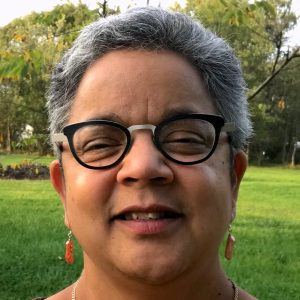
Savita Dhanvantari, PhD
Lawson Health Research Institute, Canada
“DEI is important to be because I believe that diversity enhances the quality of our science. By fearlessly and intentionally seeking out diverse voices, we will challenge conventional hypotheses, dismantle barriers within the traditional academic structure and create space for everyone in molecular imaging research. I’ve joined the DEI committee at WMIS because there is strong and genuine support from the leadership to build a more inclusive and welcoming society.“
Dr. Savita Dhanvantari received a B.Sc. in Zoology from the University of Guelph, an M.Sc. in Zoology from Western University, and a Ph.D. in Physiology from the University of Toronto. She carried out her post-doctoral studies at the National Institutes of Health in Bethesda, MD under the supervision of Dr. Y. Peng Loh.
In 2002, she joined the Lawson Health Research Institute where she is a scientist in both the Metabolism and Diabetes Program and the Imaging Program. She is also an Assistant Professor in the Department of Medical Biophysics at the University of Western Ontario, and cross-appointed to the Department of Pathology and Laboratory Medicine.
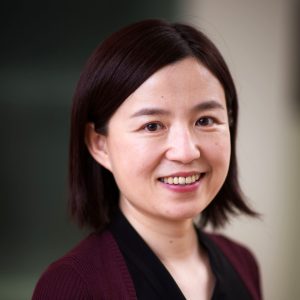
Nan Li, PhD
UT Southwestern, USA
Dr. Nan Li is currently working on developing novel whole-brain imaging methods to integrate molecular and system neuroscience and solve brain science problems. She is specifically interested in understanding the neural mechanisms of reward, learning, and memory in rodent brains. Nan has always been amazed by the beauty of the brain and concerned for patients with brain disorders. Leading a cutting-edge neuroimaging research group is quite rewarding. She hopes that ultimately her work will broaden our capacity of functional brain imaging to better understand the fundamental mechanisms and develop treatments for better brain health, which is indeed the greatest reward.

Naomi Matsuura, PhD
University of Toronto, Canada
Professor Matsuura’s Medical Imaging Materials Laboratory specializes in designing new materials that interact strongly and specifically with imaging radiation.
A major application of such materials is their use towards guiding personalized treatment of cancer for individual patients. These new materials, in the form of injectable colloids, may be remotely activated using medical imaging sources to facilitate the minimally-invasive, image-guided, local and site-specific delivery of cancer therapies to tumours in vivo, even to organs that are typically difficult to treat using systemic drug therapies (e.g., the brain).
Recently, her group has also developed a new biocompatible and clinically translatable nanoscale agent for radiosensitization of hypoxic tumours.
Her research program spans across multiple disciplines; from synthetic chemistry to physicochemical characterization, preclinical evaluation in vivo, and commercialization, with the eventual goal of clinical translation in partnership with clinical collaborators.
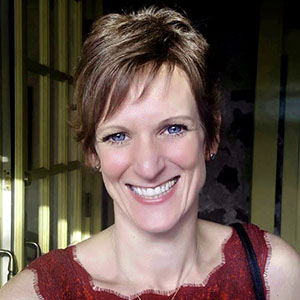
Julie Sutcliffe, PhD
University of California Davis, USA
“I believe that embracing Diversity, Equity and Inclusion will make not only our society but our world a better place. As the current co-President of WMIS I joined the WMIS DEI working group to try to do my part to make sure we are a truly diverse and inclusive society and that we provide a safe and welcoming environment for ALL our members.“
Dr. Julie Sutcliffe serves on the program committee as co-president of WMIS. She is a Professor of Biomedical Engineering and Hematology and Oncology at the University of California, Davis. She is the co-Director of The Center for Molecular and Genomic Imaging and Director of radiochemistry research. Her research efforts bridge the spectrum of research, from benchtop discovery to clinical trials, with the goal to have a significant positive impact of the improvement of patient care and transform how we detect and treat cancer. Dr Sutcliffe’s laboratory focuses on the design, synthesis, in vitro evaluation, and in vivo screening of targeted molecular imaging agents and therapeutics, with the goal of rapid deployment to the clinic. Specifically they have focused efforts on the early detection and treatment of pancreas cancer and more recently utilized molecular imaging to investigate long-term sequela of COVID-19.
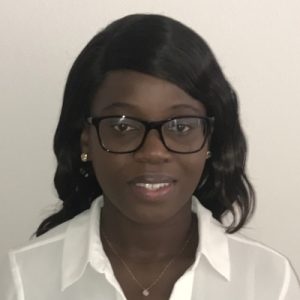
Lea Nyiranshuti, PhD
University of California Los Angeles, USA
Dr. Nyiranshuti earned her Ph.D. under the mentorship of Professor Roy P. Planalp at the University of New Hampshire. Leas Ph.D. research focused on the design, synthesis and characterization of novel bifunctional chelators and polymeric fluorescent sensors for bioavailable Cu(II), Zn(II) and Fe(III). After obtaining her Ph.D., Lea joined the laboratory of Professor Carolyn J. Anderson at the University of Pittsburgh as a postdoctoral scholar. At the University of Pittsburgh, Leas research focused on the development of PET imaging agent for imaging vaso-occlusive crisis in sickle cell disease, and imaging immune cells (macrophages, neutrophils and T-cells) in tumor microenvironment and tuberculosis granulomas. In 2019, Lea joined the Biomedical Cyclotron at UCLA where her research focuses on the development of imaging and radiotherapeutic probes targeting fibroblast activation protein and prostate specific membrane antigen.

Mei Tian, MD, PhD
Department Zhejiang University, China
Prof. Mei Tian is the Director of Nuclear Medicine Innovative Research Center of Zhejiang University, the Vice President of Zhejiang University Medical Center, the Vice President of Hangzhou Riverside Hospital of Zhejiang University School of Medicine. (Zhejiang University is one of the top-3 university in China). Dr. Tian has 20+ years post-MD training and practice in radiology, nuclear medicine and molecular imaging, and is a Distinguished Professor of Nuclear Medicine and Molecular Imaging granted by the Ministry of Education of China.
Prof. Tian’s group focuses on molecular imaging with a particular emphasis on human major diseases. Her current research interests include molecular imaging of central nerve system (CNS) diseases & psychiatric disorders, imaging-based stem cell therapy for stroke, development of novel imaging strategies for a better understanding of underlying mechanism of brain. Prof. Tian’s group has developed precision PET imaging approach on pediatric epilepsy and MRI-negative pre-operative epilepsy. Furthermore, Prof. Tian’s group has extended their research on brain-machine interface (BMI), internet gaming disorder (IGD), post-traumatic stress disorder (PTSD), etc., and continually to develop big data-based smart diagnosis for neuro-psychiatric disorders, including Epilepsy, AD, PD and others. Her group also develops novel molecular imaging agents or smart probes for precision theranostics.

Joycelyn Yiu
University of California, San Diego, USA
Joycelyn Yiu is a bioengineering graduate student at UC San Diego and holds a background in the life sciences, with a strong foundation in molecular biology, metaproteomics, and bioinformatics. As a graduate student, she has had the opportunity to work on various research projects, gaining valuable experience in data analysis and interpretation. She is highly motivated by her passion for advancing our understanding of the human gut microbiome and its impact on health and disease.







